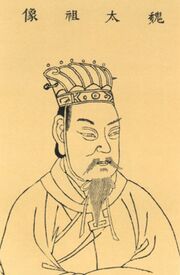شعر تساو تساو
تساو تساو (155–220)، هو أمير حرب ارتقى إلى السلطة في السنوات الأخيرة من عهد أسرة هان الشرقية (25-220م)، وأصبح الرئيس الفعلي للحكومة في الصين. وضع تساو حجر الأساس لملكة تساو وِيْ (220-265م)، التي أسسها نجله وخليفته تساو پي، في عصر الممالك الثلاث (220-280م). كانت أشعاره، من بين إرثه الثقافي، من بين أمور أخرى.
نظرة عامة
Cao Cao was an accomplished poet, as were his sons Cao Pi and Cao Zhi. Cao Cao was also a patron of poets such as Xu Gan.[1] Of Cao Cao's works, only a remnant remain today. His verses, unpretentious yet profound, helped to reshape the poetic style of his time and beyond, eventually contributing to the poetry styles associated with Tang dynasty poetry. Cao Cao, Cao Pi and Cao Zhi are known collectively as the "Three Caos". The Three Caos' poetry, together with additional poets, eventually developed into the Jian'an style: Jian'an was the era name for the period from 196 to 220. Poets of the Cao family and others continued to write and develop the poetry of this style, after the end of the Han dynasty and the subsequent founding of the Cao Wei state: these were the Jian'an poets. The effects of civil strife on poetry towards the end of the Eastern Han dynasty contributed to the development of a solemn and heart-stirring tone of lament for life's ephemeral nature during the period of Jian'an poetry.
From its roots in Han poetry folk songs, Jian'an poetry evolved into a form of scholarly poetry that is characteristic of Six Dynasties poetry. Cao Cao and other Jian'an poets developed the characteristic Han fu (or yuefu) poetry style deriving from folk song or ballad traditions, such as of uneven line lengths. Irregular lines became transformed into regular five-character line-length styles, very similar (and inspirational to) the shi poetry of the Tang dynasty's five-character regular line. Cao Cao has specifically been noted for his ballad-style verse, which he apparently set to music.[2]
Cao Cao also wrote verse in the older four-character per line style characteristic of the Classic of Poetry. Burton Watson describes Cao Cao as: "the only writer of the period who succeeded in infusing the old four-character metre with any vitality, mainly because he discarded the archaic diction associated with it and employed the ordinary poetic language of his time."[3] Cao Cao is also known for his early contributions to the Shanshui poetry genre, with his 4-character-per-line, 14-line poem "View of the Blue Sea" (觀滄海).[4]
قصائده
بالرغم من أن السلحفاة تعمر طويلاً
|
《龜雖壽》 |
بالرغم من أن السلحفاة تعمر طويلاً |
|
神龜雖壽,猶有竟時。 |
بالرغم من أن السلحفاة المباركة بقوى سحرية تعمر طويلاً، |
|
騰蛇乘霧,終為土灰。 |
بالرغم من أن الثعابين المجنحة تحلق عالياً فوق الضباب، |
|
老驥伏櫪,志在千里; |
فرس الحرب العجوز يكلأ في حظيرة وفيرة، |
|
烈士暮年,壯心不已。 |
والرجل ذو القلب النبيل بالرغم من تقدمه في العمر |
|
盈縮之期,不但在天; |
عمر الإنسان، طال أو قصر، |
|
養怡之福,可得永年。 |
فمن يأكل جيداً ويبقى مرحاً |
|
幸甚至哉!歌以咏志。 |
ولذلك، فبفرحة في قلبي، |
أسلوب الأغاني القصيرة

وهناك قصيدة فائقة الشهرة لتساو تساو، كتبها مباشرة قبل معركة المنحدرات الحمراء في شتاء 208 م، وهي أسلوب الأغاني القصيرة. (短歌行)
|
《短歌行》 |
أسلوب الأغاني القصيرة |
|
對酒當歌,人生幾何? |
أرفع شرابي وأنشد أغنية، |
|
譬如朝露,去日苦多。 |
فما عمر المرء إلا كندى الصباح، |
|
慨當以慷,憂思難忘。 |
الحزن المولود في فؤادي، |
|
何以解憂?唯有杜康。 |
ما الذي يمكنه فك محني؟ |
|
青青子衿,悠悠我心。 |
حواريي يتسربلون زرقاً، |
|
但為君故,沈吟至今。 |
فأنت السبب، |
|
呦呦鹿鳴,食野之蘋。 |
في الضفة المقابلة، الأيل يثغو، |
|
我有嘉賓,鼓瑟吹笙。 |
ضيوفي المكرمين، أحييكم، |
|
明明如月,何時可掇? |
لكم هي مشرقة آشعة القمر، |
|
憂從中來,不可斷絕。 |
فكري فيكِ ينبع من داخلي، |
|
越陌度阡,枉用相存。 |
أخلائي مروا عليّ من الطريق الريفي، |
|
契闊談宴,心念舊恩。 |
لقاء طال انتظاره، احتفلنا به، |
|
月明星稀,烏鵲南飛, |
النجوم حول الأقمار قليلة، |
|
繞樹三匝,何枝可依? |
طاروا دون راحة، |
|
山不厭高,海不厭深。 |
فلا من جبل عسير عليهم، |
|
周公吐哺,天下歸心。 |
يتوقف الحكيم [عن الطعام] حين يناديه الضيوف، |
انظر أيضاً
Notes
References and further reading
- A. R. (Albert Richard) Davis, Editor and Introduction (1970). The Penguin Book of Chinese Verse. Penguin Books.
{{cite book}}:|author=has generic name (help) - Burton Watson (1971). Chinese Lyricism: Shih Poetry from the Second to the Twelfth Century. Columbia University Press. ISBN 0-231-03464-4.
- Yip, Wai-lim (1997). Chinese Poetry: An Anthology of Major Modes and Genres. (Durham and London: Duke University Press). ISBN 0-8223-1946-2
- Xiao Tong. Wen Xuan.
